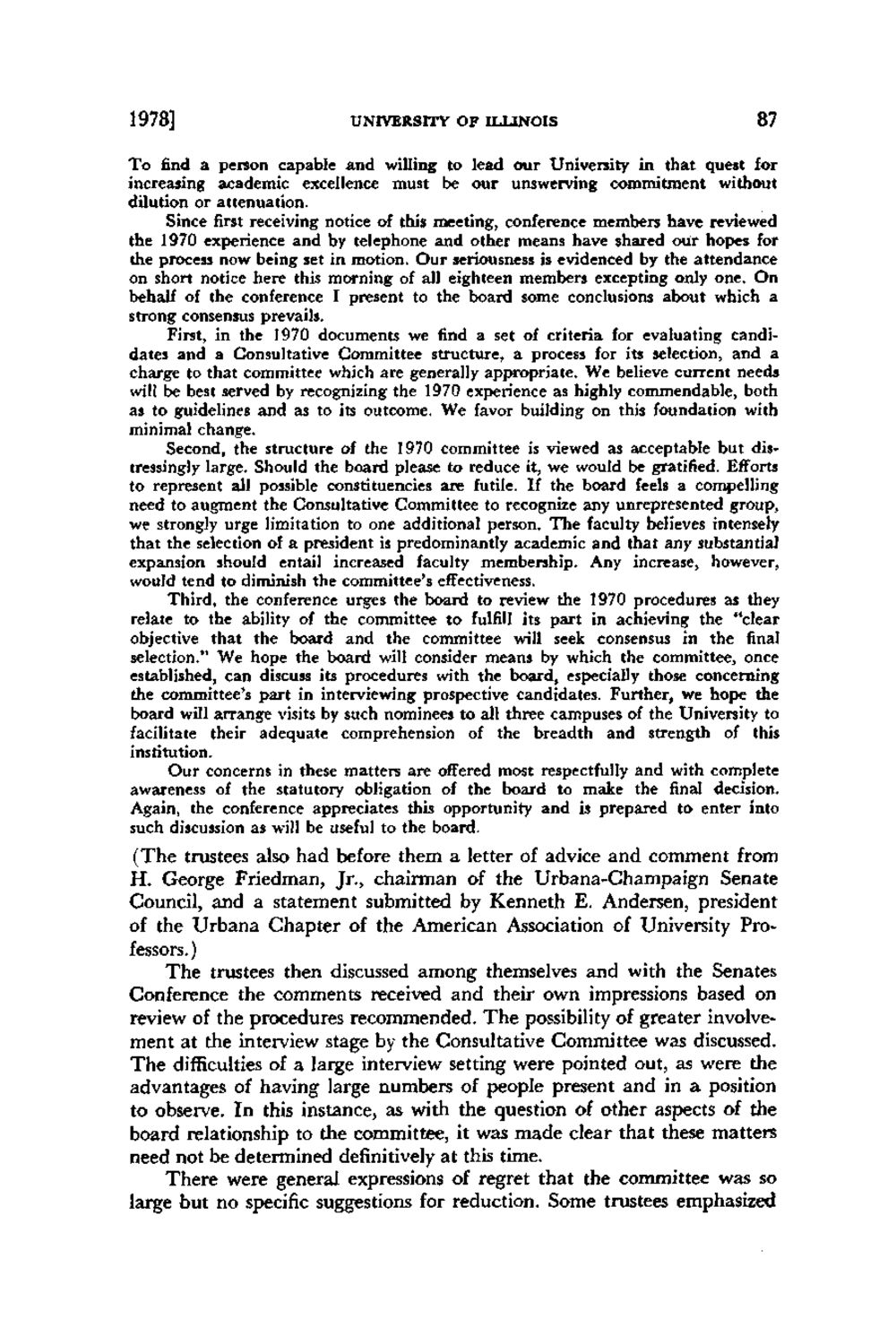| |
| |
Caption: Board of Trustees Minutes - 1980
This is a reduced-resolution page image for fast online browsing.

EXTRACTED TEXT FROM PAGE:
1978] UNIVERSITY OF ILLINOIS 87 T o find a person capable a n d willing to lead our University in that quest for increasing academic excellence must be our unswerving commitment without dilution or attenuation. Since first receiving notice of this meeting, conference members have reviewed the 1970 experience and by telephone and other means have shared our hopes for the process now being set in motion. O u r seriousness is evidenced by the attendance on short notice here this morning of all eighteen members excepting only one. On behalf of the conference I present to the board some conclusions about which a strong consensus prevails. First, in the 1970 documents we find a set of criteria for evaluating candidates and a Consultative Committee structure, a process for its selection, and a charge to that committee which are generally appropriate. We believe current needs will be best served by recognizing the 1970 experience as highly commendable, both as to guidelines and as to its outcome. We favor building on this foundation with minimal change. Second, the structure of the 1970 committee is viewed as acceptable but distressingly large. Should the board please to reduce it, we would be gratified. Efforts to represent all possible constituencies are futile. If the board feels a compelling need to augment the Consultative Committee to recognize any unrepresented group, we strongly urge limitation to one additional person. T h e faculty believes intensely that the selection of a president is predominantly academic and that any substantial expansion should entail increased faculty membership. Any increase, however, would tend to diminish the committee's effectiveness. Third, the conference urges the board to review the 1970 procedures as they relate to the ability of the committee t o fulfill its part in achieving the "clear objective that the board and the committee will seek consensus in the final selection." We hope the board will consider means by which the committee, once established, can discuss its procedures with the board, especially those concerning the committee's part in interviewing prospective candidates. Further, we hope the board will arrange visits by such nominees to all three campuses of the University to facilitate their adequate comprehension of the breadth and strength of this institution. Our concerns in these matters are offered most respectfully and with complete awareness of the statutory obligation of the board to make the final decision. Again, the conference appreciates this opportunity and is prepared to enter into such discussion as will be useful to the board. ( T h e trustees also h a d before them a letter of advice and comment from H . George Friedman, Jr., chairman of the Urbana-Champaign Senate Council, and a statement submitted by K e n n e t h E. Andersen, president of the U r b a n a C h a p t e r of the American Association of University Professors.) T h e trustees then discussed among themselves and with the Senates Conference the comments received and their own impressions based on review of the procedures recommended. T h e possibility of greater involvement at the interview stage by t h e Consultative Committee was discussed. T h e difficulties of a large interview setting were pointed out, as were the advantages of having large numbers of people present and in a position to observe. I n this instance, as with the question of other aspects of the board relationship to the committee, it was m a d e clear that these matters need not be determined definitively at this time. T h e r e were general expressions of regret that the committee was so large but n o specific suggestions for reduction. Some trustees emphasized
| |